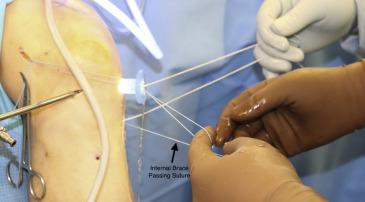
Credit: Chad Lavender, M.D., Marshall University
HUNTINGTON, W.Va. – An innovative procedure that explores the use of amnion, bone marrow concentrate and suture tape in anterior cruciate ligament (ACL) reconstruction may result in earlier return to play protocols for athletes, suggests a new Marshall University study published in the May 6, 2019, edition of Arthroscopy Techniques, a companion to Arthroscopy: The Journal of Arthroscopic and Related Surgery.
The ACL is one of four major ligaments that stabilize the knee. An ACL tear is one of the most common types of knee injuries, most often occurring during high-demand sports such as soccer or football. Traditional ACL reconstruction requires a graft to replace the ligament. Small tunnels are drilled into the bone above and below the knee for screws to keep the graft in place. Small buttons may also be used along the bone’s edge to secure the graft.
In the Arthroscopy Techniques article, Chad D. Lavender, M.D., lead author and assistant professor of orthopaedic surgery at the Marshall University Joan C. Edwards School of Medicine, and Charles Bishop, M.D., a fifth-year orthopaedic resident at Marshall’s School of Medicine, outline a new process that fills, or “fertilizes,” these tunnels with a mixture of amnion, bone marrow concentrate and suture tape to speed up recovery and stabilize the knee. Amnion is used due to its potential to decrease adhesions, possibly protect ACL grafts and increase vascularization by acting as a scaffold. Bone marrow concentrate containing the patient’s mesenchymal stem cells combined with Allosync has the potential to increase the speed and quality of graft bone incorporation, especially when used in the setting of a soft-tissue allograft. Using suture tape augmentation with the reconstruction has been thought to increase the early strength of the reconstruction.
“There are early advantages to fertilized ACL reconstruction such as decreased pain, and when this is combined with biologics, we may be able to accelerate rehabilitation and return to play more than previously anticipated,” Lavender said.
The study builds off Lavender’s previous approach using bone marrow concentrate and a suture tape, as published in the November 19, 2018, edition of Arthroscopy Techniques.
To date, Lavender has successfully completed more than 30 procedures using some form of the fertilized ACL. Patients have reported the same results as the standard ACL reconstruction with shorter recovery times, significantly less pain and no known additional risks. Future research will determine whether using this technique could shorten the return to play for athletes and reduce the use of opioids post-surgery.
###
To read the article in its entirety, please visit https://www.arthroscopytechniques.org/article/S2212-6287(19)30027-1/fulltext.
Media Contact
Michele McKnight
[email protected]
Original Source
https:/
Related Journal Article
http://dx.




